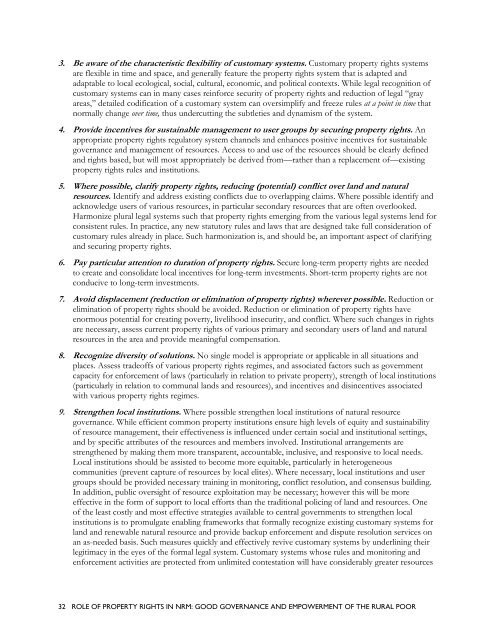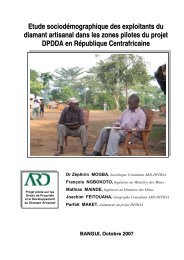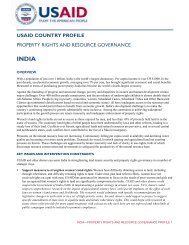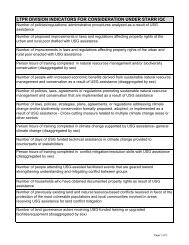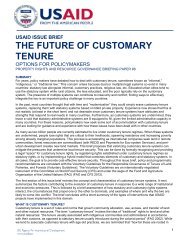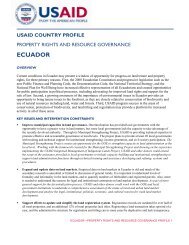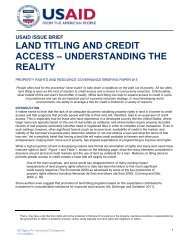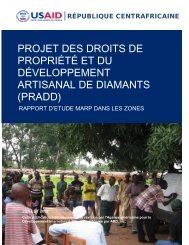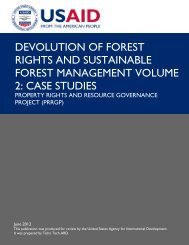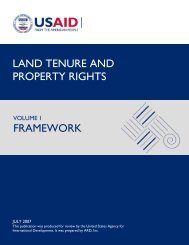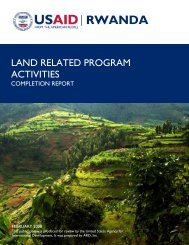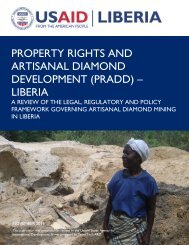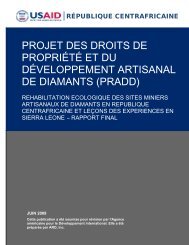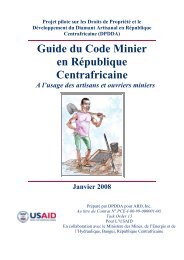the role of property rights in natural resource management, good ...
the role of property rights in natural resource management, good ...
the role of property rights in natural resource management, good ...
You also want an ePaper? Increase the reach of your titles
YUMPU automatically turns print PDFs into web optimized ePapers that Google loves.
3. Be aware <strong>of</strong> <strong>the</strong> characteristic flexibility <strong>of</strong> customary systems. Customary <strong>property</strong> <strong>rights</strong> systemsare flexible <strong>in</strong> time and space, and generally feature <strong>the</strong> <strong>property</strong> <strong>rights</strong> system that is adapted andadaptable to local ecological, social, cultural, economic, and political contexts. While legal recognition <strong>of</strong>customary systems can <strong>in</strong> many cases re<strong>in</strong>force security <strong>of</strong> <strong>property</strong> <strong>rights</strong> and reduction <strong>of</strong> legal “grayareas,” detailed codification <strong>of</strong> a customary system can oversimplify and freeze rules at a po<strong>in</strong>t <strong>in</strong> time thatnormally change over time, thus undercutt<strong>in</strong>g <strong>the</strong> subtleties and dynamism <strong>of</strong> <strong>the</strong> system.4. Provide <strong>in</strong>centives for susta<strong>in</strong>able <strong>management</strong> to user groups by secur<strong>in</strong>g <strong>property</strong> <strong>rights</strong>. Anappropriate <strong>property</strong> <strong>rights</strong> regulatory system channels and enhances positive <strong>in</strong>centives for susta<strong>in</strong>ablegovernance and <strong>management</strong> <strong>of</strong> <strong>resource</strong>s. Access to and use <strong>of</strong> <strong>the</strong> <strong>resource</strong>s should be clearly def<strong>in</strong>edand <strong>rights</strong> based, but will most appropriately be derived from—ra<strong>the</strong>r than a replacement <strong>of</strong>—exist<strong>in</strong>g<strong>property</strong> <strong>rights</strong> rules and <strong>in</strong>stitutions.5. Where possible, clarify <strong>property</strong> <strong>rights</strong>, reduc<strong>in</strong>g (potential) conflict over land and <strong>natural</strong><strong>resource</strong>s. Identify and address exist<strong>in</strong>g conflicts due to overlapp<strong>in</strong>g claims. Where possible identify andacknowledge users <strong>of</strong> various <strong>resource</strong>s, <strong>in</strong> particular secondary <strong>resource</strong>s that are <strong>of</strong>ten overlooked.Harmonize plural legal systems such that <strong>property</strong> <strong>rights</strong> emerg<strong>in</strong>g from <strong>the</strong> various legal systems lend forconsistent rules. In practice, any new statutory rules and laws that are designed take full consideration <strong>of</strong>customary rules already <strong>in</strong> place. Such harmonization is, and should be, an important aspect <strong>of</strong> clarify<strong>in</strong>gand secur<strong>in</strong>g <strong>property</strong> <strong>rights</strong>.6. Pay particular attention to duration <strong>of</strong> <strong>property</strong> <strong>rights</strong>. Secure long-term <strong>property</strong> <strong>rights</strong> are neededto create and consolidate local <strong>in</strong>centives for long-term <strong>in</strong>vestments. Short-term <strong>property</strong> <strong>rights</strong> are notconducive to long-term <strong>in</strong>vestments.7. Avoid displacement (reduction or elim<strong>in</strong>ation <strong>of</strong> <strong>property</strong> <strong>rights</strong>) wherever possible. Reduction orelim<strong>in</strong>ation <strong>of</strong> <strong>property</strong> <strong>rights</strong> should be avoided. Reduction or elim<strong>in</strong>ation <strong>of</strong> <strong>property</strong> <strong>rights</strong> haveenormous potential for creat<strong>in</strong>g poverty, livelihood <strong>in</strong>security, and conflict. Where such changes <strong>in</strong> <strong>rights</strong>are necessary, assess current <strong>property</strong> <strong>rights</strong> <strong>of</strong> various primary and secondary users <strong>of</strong> land and <strong>natural</strong><strong>resource</strong>s <strong>in</strong> <strong>the</strong> area and provide mean<strong>in</strong>gful compensation.8. Recognize diversity <strong>of</strong> solutions. No s<strong>in</strong>gle model is appropriate or applicable <strong>in</strong> all situations andplaces. Assess trade<strong>of</strong>fs <strong>of</strong> various <strong>property</strong> <strong>rights</strong> regimes, and associated factors such as governmentcapacity for enforcement <strong>of</strong> laws (particularly <strong>in</strong> relation to private <strong>property</strong>), strength <strong>of</strong> local <strong>in</strong>stitutions(particularly <strong>in</strong> relation to communal lands and <strong>resource</strong>s), and <strong>in</strong>centives and dis<strong>in</strong>centives associatedwith various <strong>property</strong> <strong>rights</strong> regimes.9. Streng<strong>the</strong>n local <strong>in</strong>stitutions. Where possible streng<strong>the</strong>n local <strong>in</strong>stitutions <strong>of</strong> <strong>natural</strong> <strong>resource</strong>governance. While efficient common <strong>property</strong> <strong>in</strong>stitutions ensure high levels <strong>of</strong> equity and susta<strong>in</strong>ability<strong>of</strong> <strong>resource</strong> <strong>management</strong>, <strong>the</strong>ir effectiveness is <strong>in</strong>fluenced under certa<strong>in</strong> social and <strong>in</strong>stitutional sett<strong>in</strong>gs,and by specific attributes <strong>of</strong> <strong>the</strong> <strong>resource</strong>s and members <strong>in</strong>volved. Institutional arrangements arestreng<strong>the</strong>ned by mak<strong>in</strong>g <strong>the</strong>m more transparent, accountable, <strong>in</strong>clusive, and responsive to local needs.Local <strong>in</strong>stitutions should be assisted to become more equitable, particularly <strong>in</strong> heterogeneouscommunities (prevent capture <strong>of</strong> <strong>resource</strong>s by local elites). Where necessary, local <strong>in</strong>stitutions and usergroups should be provided necessary tra<strong>in</strong><strong>in</strong>g <strong>in</strong> monitor<strong>in</strong>g, conflict resolution, and consensus build<strong>in</strong>g.In addition, public oversight <strong>of</strong> <strong>resource</strong> exploitation may be necessary; however this will be moreeffective <strong>in</strong> <strong>the</strong> form <strong>of</strong> support to local efforts than <strong>the</strong> traditional polic<strong>in</strong>g <strong>of</strong> land and <strong>resource</strong>s. One<strong>of</strong> <strong>the</strong> least costly and most effective strategies available to central governments to streng<strong>the</strong>n local<strong>in</strong>stitutions is to promulgate enabl<strong>in</strong>g frameworks that formally recognize exist<strong>in</strong>g customary systems forland and renewable <strong>natural</strong> <strong>resource</strong> and provide backup enforcement and dispute resolution services onan as-needed basis. Such measures quickly and effectively revive customary systems by underl<strong>in</strong><strong>in</strong>g <strong>the</strong>irlegitimacy <strong>in</strong> <strong>the</strong> eyes <strong>of</strong> <strong>the</strong> formal legal system. Customary systems whose rules and monitor<strong>in</strong>g andenforcement activities are protected from unlimited contestation will have considerably greater <strong>resource</strong>s32 ROLE OF PROPERTY RIGHTS IN NRM: GOOD GOVERNANCE AND EMPOWERMENT OF THE RURAL POOR


